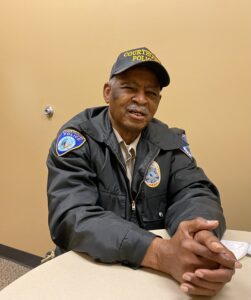
The 19 year old Airman from McConnell Air Force base was headed to Wichita Falls Texas, when the bus stopped at the Union Bus Terminal in Oklahoma City. Ernie Rhodes had an extra bounce in his step as he got off the bus, proudly wearing his khaki Air Force uniform. It was 1955.
Rhodes was far away from where he grew up in the Old Confederacy: Newport News, Virginia, was where he was born and raised. Rhodes went into the restaurant at the bus terminal and sat down, eager to get a bite to eat. The restaurant service seemed awfully slow, and then he noticed the waitress serving patrons who arrived at the restaurant after he did.
The Oklahoma City Police Lieutenant
Rhodes politely said: “Ma’am, can I order my meal?” The waitress said bluntly: “We don’t serve niggers.” He waited a while longer, and again pleaded with the waitress. He pointed to his uniform, and said: “I’m serving in the Air Force. I just want to get something to eat.” Again, she said: “Still, we don’t serve niggers.” The waitress informed the manager that Rhodes was causing trouble. Rhodes didn’t know that segregation in Oklahoma City restaurants would go unchallenged until a 1958 sit-in at Katz Drug Store. In Wichita the Dockum Drug Store sit-in was the same year.
Frustrated, but still wise enough to not show his temper, Ernie Rhodes said “I felt like there was a warm presence behind my neck.” He turned his head and saw two “huge white police officers” behind him.
Rhodes thought he was going to jail for simply asking to be served a meal in a public restaurant. He became especially terrified when a third policeman showed up, this one a Lieutenant: the boss of the other two policemen. “Let me handle this,” the Lieutenant said, as he waved off the other two white officers.
The white Lieutenant commanded Rhodes: “Come with me.” He escorted Rhodes toward an unmarked police car. Rhodes thought he was under arrest, so Rhodes opened the back door of the police car to get in.
“No, no, you can ride in the front seat with me,” the Lieutenant said. Rhodes nervously got in the front seat, still petrified. When the Lieutenant began driving the car, Ernie Rhodes thought they were going to the jail. He then noticed that the policemen drove into the segregated Deuce Town and Brickyard section Oklahoma City, and pulled up in front of a black-owned restaurant called the “White House Cafe.” “The Lieutenant walked in with Rhodes and told the black proprietor: “Mama, give us both a big steak!”
They ate like kings, with the Lieutenant picking up the tab. Still, Rhodes had a “too good to be true” feeling until the Lieutenant dropped him back off at the bus station and wished him well on his journey to Texas.
A Childhood in the Deep South
The savage words of the waitress in Oklahoma surprised Rhodes. He was accustomed to such treatment in his childhood home of Virginia, where he attended segregated schools, while watching his mother work seven days a week as “domestic help” for a local white family. “We barely scraped by,” he says. His mother was a single parent, and Rhodes decided to quit his segregated high school at 17 to join the Air Force in July 1954 to help provide for the family. He ended up in Wichita at McConnell Air Force Base, and served in the Air Force for “three years, three months, and two days,” he says. He left the Air Force in 1957. But he would spend the rest of his life in or near Kansas.
Hank Aaron once wrote about growing up an African-American in Mobile, Alabama: “At least in the South they told you to your face they hated your guts.” But things in Kansas and Oklahoma were more confusing, more subtle, yet equally cruel. “In Virginia, there was NO QUESTION. Everything was segregated: schools, drinking fountains, restrooms,” said Rhodes, loudly emphasizing the words “NO QUESTION.”
In 1950 a white gas station owner, Lloyd Christianbury, was kind enough to gave the 13-year-old Rhodes a chance to pump gas. One day the boss had to run a quick errand, and asked Rhodes to “be in charge” of the gas station until he got back.
That is when Ernie Rhodes broke the biggest taboo in the South. “You couldn’t touch a white woman. You couldn’t even look at a white woman the wrong way, or you might get killed,” he says today, 70 years later.
A white co-worker, an adult named Sidney, had a girlfriend who would often drop by the gas station. She would often play around with the cash register. When she pushed a button and the cash drawer opened, full of cash, she reached for money, and instinct took over: “I walked over and closed the cash drawer, and jammed her finger as I closed the drawer,” said Rhodes. Ernie did the right thing by his boss, but he had shattered the taboo: in trying to do the right thing, he jammed the finger of the white girl.
By that time, Sidney, the girlfriend, and two of Sidney’s white friends were in the gas station. They were all adults, and all white. They told Ernie he was going to die. “We are going to have to kill you for hitting a white woman. We like you, Bubba, but someone has to die, if not you, maybe one of your cousins.” Ernie knew he had shattered the most sacred prohibition in the South. It was 1950, five years before Emmett Till lost his life, but Rhodes was possibly headed for the same fate.
Rhodes asked if he could go home and say goodbye to his mother before they killed him. They consented. Ernie went home and put a big butcher knife inside his trousers. When he returned to the gas station, he went to the corner of the room where he knew no one could come up behind him. He pulled the butcher knife out of his pants and brandished it at the three adult white men and the woman. “If you’re going to kill me, let’s go,” he said, as his hands shook holding the knife.
The boss, Lloyd Christianbury, suddenly pulled up and was back from his errand. He saw the boy holding the butcher knife, surrounded by racist bullies. The white manager lost his temper. He cussed out the three men, and fired Sidney on the spot. In spite of savage racism, Ernie found that at key times, there was often one white person who stood in the gap.
The Difficult Road Trip from Kansas Back Home
In the early 1960’s, Rhodes drove his Beige 1950 Pontiac from Wichita to Newport News, Virginia to visit his mother. He took pride in his car, and wanted to add a quart of oil for the long journey. He stopped at a Phillips 66 in Paducah, Kentucky.
Ernie politely asked the white attendant for a quart of “Havoline 10w30 motor oil.” The attendant said: “They don’t make Havoline 10w30.” Ernie thought he had misspoke, and again he said: “I need a quart of Havoline 10w30 motor oil.”
The attendant inexplicably said again: “They don’t make Havoline 10w30.” But Ernie only used Havoline 10W30 in his car, and he knew every gas station in America had it. “You’re crazy,” he said to the attendant. “You have to be crazy. Are you crazy? Every gas station in America has Havoline 10w30.” Ernie was not angry, just perplexed.
The attendant looked menacingly across the street. “There was a tavern, a honky tonk with swinging doors like in those westerns across the street,” said Rhodes. The attendant walked into the honky tonk and came out with a large white man who walked back across to the gas station. They were eager to give the Air Force man a thrashing. When Rhodes saw the man from the tavern holding a big knife, he said: “You are right. They don’t make Havoline 10w30 motor oil.” He got in his car to leave. When the car was leaving the gas station, the attendant saw it had Kansas tags and ran up to his car window shouting: “Don’t you come back through Paducah on your way back to Kansas!”
When he got to Louisville, Kentucky, Rhodes stopped at a Standard Oil Station to purchase gasoline. He was thirsty, more than anything. He asked: “Do you have a water fountain?” The white attendant said: “What is a water fountain?” Again, Rhodes thought he was getting the same treatment.
The attendant said: “Follow me and I’ll get you a drink of water.” Ernie followed him into the gas station. When the attendant started to get toward the back room of the gas station, Rhodes got nervous. Then the attendant opened the back door, grabbing a big dipper with a long handle on the back door, and asked Rhodes to walk down a hill with him. 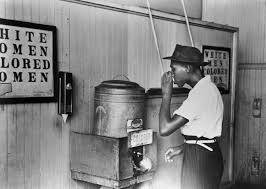
Rhodes and the attendant walked down to a creek right behind the gas station. The attendant handed Rhodes the dipper with a handle, and said he could get a drink out of the creek. Ernie nervously scooped up some water from the creek and tasted it. It was delicious. He was thrilled that the trip behind the station wasn’t a plan to hurt him, and said: “Man, that water tastes so good, I’m ready to die right now.” Realizing his double meaning, he said: “I don’t want to die, but that was good!” The white gas station attendant then grabbed the dipper and drank a big scoop of the river water himself.
Rhodes and the white gas station owner then had a meaningful discussion about race. The white man said: “Ernie, I don’t know what is wrong with my people. Why would white folks refuse to let blacks attend public schools?,” he said. Racial tension was heating up in Louisville, home to a young pugilist named Cassius Clay. Louisville’s Jim Crow segregation was not challenged successfully until 1961, a year after Cassius Clay won his Gold Medal in Rome.
The Newton, Kansas Years
After leaving the Air Force in 1957, Rhodes lived in Newton Kansas for a few years, and marveled at how kind the Mennonite-based community was towards him. “I had been a fireman and worked in the motor pool in the Air Force. The Newton Fire Chief let me train with the fire department there. He wanted to hire me. He told me I had the qualifications and experience. But the white fire chief told Ernie: “I want to hire you, but they won’t let me.” “That was the only negative experience I had had in Newton,” he said.
In Newton Rhodes drove a black Pontiac with double pipes and big white wall tires. His ride did little to help Rhodes blend into the Mennonite community. “You could hear my car all over town. I shined it up. Everybody knew about it,” he says with pride. He only got one ticket in Newton, and was even the first black member of the Newton Jaycees.
After being turned down for the fire department, Rhodes worked for Rhoades Construction, a highway building company, and then for a grain elevator company called Chalmers and Borton. Finally Rhodes went to work for the Santa Fe Railroad in the railroad-centric town of Newton. He loved to hear the train whistles and hear the loudspeaker shout “El Capitan,” welcoming the Super Chief passenger train in Newton, a famous train that went from Chicago to Los Angeles.
He and his co-workers were sent out to a section to fix a piece of broken railroad track in 1963 when they got the news that JFK had been assassinated. “The fellows fixing the railroad track with me were all blacks, Mexicans or Indians. We all sat down on the track and cried,” he says wistfully, nearly sixty years later. He noted that President Kennedy had initiated Civil Rights legislation to help remedy the problems he experienced as a young man.
The Bus Driver Who Couldn’t Hit
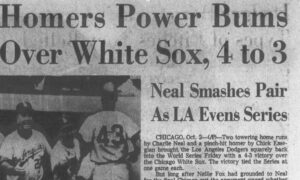
Rhodes then moved to Wichita, as a bus driver for the Metropolitan Transit Authority. The City of Wichita bus service was owned and operated by Rapid Transit Lines, Inc, owned by Bernie Calkins, who happened to be a baseball fanatic. Calkins hired several former major league players to drive buses: Bobby Boyd, the former Chicago White Sox outfielder was one. Jim Pendleton, a star with the Houston Colt .45’s (later Astros) was another, along with minor league star Billy Springfield. Charlie Neal hit two home runs in one World Series Game in 1959 for the Dodgers before moving to Wichita to drive a bus for Calkins.
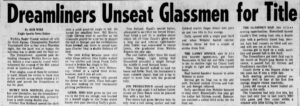
The thing is, the Rapid Transit company sponsored an National Baseball Congress semi-pro team, and the owner of the team and the company hired these “ringers” to work for him: driving buses and playing baseball. “I tried out for the team but I couldn’t hit,” said Rhodes. The Dreamliners won the National Baseball Congress tournament in 1962, 1963 and 1965.
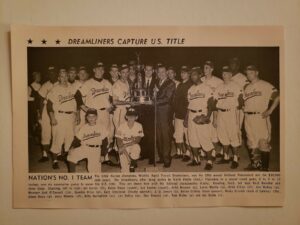
Friends University: Another safe haven
Rhodes’ bus route went to Friends University. Lots of students and professors encouraged him to enroll at Friends and get a college degree. Rhodes found the Quakers to be just as friendly toward black folks as the Mennonites in Newton. He enrolled in 1970 and got his degree in philosophy and religion in 1974. He has been a preacher ever since.
College Degree Leads to Work in Criminal Justice
Sedgwick County hired Rhodes as a juvenile caseworker in 1974. “The juvenile delinquents were in a jail on the 8th floor of the courthouse,” he says. He and the others were pretty good at “scaring juvenile delinquents straight.” He said kids today are different from the ones he worked with: “These kids today, they have no respect for the law or authority. Everyone thinks the world owes them a living.”
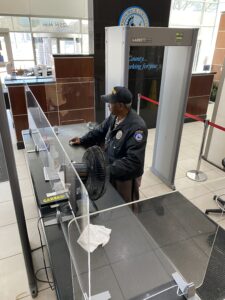
After court unification by the State of Kansas, Rhodes worked as an adult probation officer from 1981-89. “My retirement party was on Friday December 11, 1998, but I started back up with Sedgwick County on Monday, December 14, 1998 with Courthouse Security,” he says, recalling exact dates. He still works full-time in courthouse security at the Sedgwick County Courthouse at age 84.
Rhodes remembers the intensity of the courthouse when BTK and other famous trials were going on. “I enjoy seeing the lawyers, and courthouse staff,” he says. The county departments used to play in a basketball league against each other. He recalled that the lanky trial lawyer Larry Wall “was tall and a good pivot man.” Even today, it is not unusual for a former juvenile delinquent to greet Ernie at the courthouse and says: “I was headed down a wrong path, but you set me straight,” they say, thanking him.
Ernie’s Two Ambitions in Life
“When I was a kid, I had two ambitions: I wanted to join the Air Force, and I wanted to drive a bus,” he says. “I achieved both,” he says proudly. At the annual Armistice Day parade in Newport News, he was so impressed with the marching Air Force Airmen that he would run alongside the parade, marching with them. “I ran away from home four or five times to join the Air Force, but I was way too young,” he says.
Regarding his desire to drive a bus, he recalls that he had a white friend named Herbie who drove a bus in Newport News. “As a kid, every day I would run a quarter mile just to wave at my friend Herbie as he drove the bus by a certain intersection.”
Having the opportunity to not only drive a bus in Wichita, but to drive alongside former Major League stars was a thrill. “I remember when I was a kid, Charlie Neal became one of the first black players for the Newport News Pilots in the Class B Piedmont League. He didn’t know who I was, but I sure knew who he was when we reunited in Wichita,” he said. Neal’s illustrious career started in Newport News in 1953, where he had an admiring fan. The two would later drive buses together in Wichita.
Sedgwick County would have never known Ernie Rhodes if his boss hadn’t pulled up at the gas station in 1950 and dispersed the three white men wanting to kill him. With a black boy brandishing a butcher knife at three white men and a white woman, they definitely could have killed him with no real consequences. But his boss pulled up just in time.


Wonderful, Marty! What an interesting life.
I certainly learned a lot. Several years ago I was at the courthouse and asked Ernie about segregation, and I was shocked about the Oklahoma City story, and I told him I wanted to write an article about his life. I’m glad I finally got it done.
Great story, Marty! Keep ’em coming.
Thanks, Richard. Your book about Lorenzo Fuller is something I treasure.
Terrific writing about a good guy. Thank you.
Thanks, Jim. Your family has always been on the right side of history.
So important for us to know and remember these stories. Not that long ago! Thank you very much.
Loved the story. I feel sorry for Mr. Rhodes. Thanks for sending me a copy
Thanks, Roger. The Mennonites in Newton and the Quakers at Friends University seemed to be particularly progressive on race.
Mr. Rhodes is an amazing man! I am so happy that I had an that I I that I had an opportunity to meet him. His amazing courage, courtesy, and exemplary character is definitely reflected in your article, Attorney Keenan. African Americans experienced many hardships and frustrations during that period of time that Mr. Rhodes described. Racial discrimination, segregation, and unfair treatment of Blacks were at an all time high. I thank God that Mr. Rhodes, a godly man, is still around to tell his story. Attorney Keenan, I am so happy that there are folks like you that are willing to do these types of interviews and share them with others. Continue in this endeavor as it is greatly appreciated by so many of us!